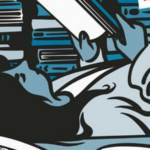When it comes to a series, a decade is both a long and short period of time—long for an author enough to start a series, long enough to publish multiple books continuing it, but not quite long enough to wrap things up. We struggled with how to pick the most iconic series of the decade—after all, many of the best series have been ongoing for multiple decades, while others are barely started but already iconic. We decided to include a few long-running series that began in previous decades in our list, but only if those series had a television adaptation, award-winning streak, or some other unique moment in the past ten years,. We also tried to include those new series that particularly defined the decade, either through engaging with the social and political zeitgeist, or embodying one of the era’s favored narrative forms.
As we composed the list, a few trends came to mind. First, crime television is better than ever, and it’s helping spread the word about many a great series. Second, procedurals are out, and private eyes are in—unless it’s a procedural that engages honestly and directly with issues regarding policing and government use of force. Third, it’s the age of the quirky series lead, the anthology series, and new American appetites for international series. Fourth, there are some great trilogies out there.
Alas, not every good series could make it into a top ten list (note, we’re reserving spy and political/action thrillers for another list), and you’ll find a list of notable series at the end of post, composed of equal parts long-running favorites and much-heralded newcomers.
___________________________________
The Crime Fiction Series That Defined the 2010s
___________________________________
 Michael Connelly’s Harry Bosch Series
Michael Connelly’s Harry Bosch Series
Sure, Harry Bosch has been around since 1992’s The Black Echo, but this was the decade where his prominence jumped up another level, thanks in part to Harry’s recent penchant for investigating cold cases, and in part to the excellent TV show starring Titus Welliver. Bosch has begun to share the stage, too, as Connelly introduces new characters like Rene Ballard, who take their turn in the spotlight. But Bosch is still the series’ guiding light, training his dogged detective skills on the almost-forgotten cases of Los Angeles and abiding by his ever-more-relevant motto: “Everybody counts or nobody counts.” With recent standouts like Dark Sacred Night, Connelly has shown that the series is as good as ever and will be going strong for years to come.
 Tana French’s Dublin Murder Squad Series
Tana French’s Dublin Murder Squad Series
Is the modern day anthology series boom inspired by Tana French’s Dublin Murder Squad series? Did Ryan Murphy basically copy Tana French with American Horror Story? Only time (and vast amounts of speculation) will tell, but the point is that Tana French’s Dublin Murder Squad is brilliant and everyone should read it, irrespective of whether you have already watched the adaptation or not. The secret to French’s brilliance lies in her approach to form: she’s not so much interested in solving mysteries, as she is with pairing each protagonist with a crime that resonates so deeply within their own psychology that they will be slowly driven mad by the solving of it. This set-up is part of why French switches to a new protagonist with each book, connecting the series through shared worlds and secondary characters. She went rogue with 2018’s The Witch Elm, which we loved, but we’re also psyched for the new TV series and looking forward to many more Dublin Murder Squad books to come.
 Sara Gran’s Claire DeWitt Series
Sara Gran’s Claire DeWitt Series
Quite simply, this is the strangest, most electric crime fiction series of the decade. Gran’s mysteries breathe new life into detective fiction and bounce wildly, exuberantly between eras, locations, and moods. From her hometown of Brooklyn to her spiritual PI home of New Orleans, from the Bay Area to the East Village in the 1980s, DeWitt tracks down the mysteries of misfits and outcasts, eccentrics and counterculture warriors. She’s the disciple of the avowed “world’s greatest detective,” Jacques Silette, and spends much of her time meditating on the principles he laid out in his obscure tome on detection, then dives headlong into her next case, which always radiates out into yet another mystery. There is no easy way to describe a Sara Gran mystery except to say that you just have to be prepared to go along for the ride. She’s the rightful heir to James Crumley, but has brought that boozed-up, tripped-out, road-ready sensibility to a new generation of mystery fans and created some iconic novels along the way.
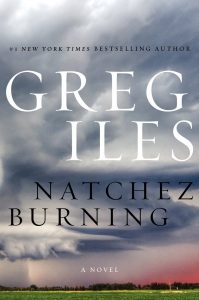 Greg Iles’ Natchez Burning Trilogy
Greg Iles’ Natchez Burning Trilogy
Starting in 2014 with the novel that gives its name to the trilogy, Natchez Burning, Greg Iles laid out for himself one of the most ambitious and sprawling epics in modern crime fiction. Part of the larger Penn Cage series, these three novels, each weighing in at many, many hundreds of pages—Natchez Burning, The Bone Tree, and Mississippi Blood—tell a deeply complex, deeply American story of inter-generational sins, injustice, and family reckonings. Iles’ protagonist, the career prosecutor Penn Cage, sees his life turned upside down when his father, a respected physician, is accused of murder, and the crimes trace back to an illicit affair and a string of secrets. Iles’ work lies somewhere between the southern gothic tradition of family horrors and Grisham’s best thrillers, where racial legacies and injustices were litigated in the courtroom and in small-town communities in the South. These are legal dramas for a new time.
 Philip Kerr’s Bernie Gunther Series
Philip Kerr’s Bernie Gunther Series
While Kerr began this series in the 1980s, there’s a sad reason to include the Bernie Gunther series in this list—Kerr died in March of 2018, leaving behind a legacy of 30+ novels (plus several unpublished works in the series). While other authors of WWII-set historicals have carved out particular spaces for settings, including Alan Furst with his before-the-war books, and Joseph Kanon’s exploration of the war’s aftermath, Kerr followed his detective Gunther from the shadowy 1930s up until the cynical 60s, as Bernie outlives all his old enemies and finds himself a dinosaur in the midst of a never-ending Cold War.
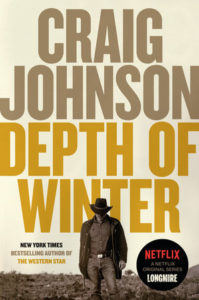 Craig Johnson’s Walt Longmire Series
Craig Johnson’s Walt Longmire Series
Here’s another series that has been going for longer than just this decade past, but hit another stratosphere of popularity thanks in part to a TV show with a dedicated following coming fresh to the characters. Only Longmire isn’t just about popularity; it’s also about the storytelling and the deep sense of community it inspires in readers. There’s a good reason people flock by the thousands every year to Longmire Days in Buffalo, Wyoming. Author Craig Johnson has created a deeply human cast of characters and put them into a modern-day western that strikes a particular chord in readers and viewers alike, and meanwhile is telling increasingly intense stories, like the 2018 installment, Land of Wolves, which saw Walt journey into the deserts of North Mexico to save his daughter. Johnson is taking new risks with the series, and they’re paying off. With Longmire, Johnson has established himself as an absolute master of the modern western.
 Attica Locke’s Highway 59 Series
Attica Locke’s Highway 59 Series
Darren Matthews is the hero we want—and the hero we need. Attica Locke already showed herself adept at crafting multi-book character character arcs with her Jay Porter novels, Black Water Rising and Pleasantville, featuring a civil rights activist turned lawyer in the 1960s through the 1980s, and her Darren Matthews series takes a similar approach to the contradictions of the Black experience. Matthews is a Texas Ranger tasked with taking down the Aryan Brotherhood, but he’s not so confident in his superiors’ commitment to the cause. Bluebird, Bluebird, the first in the series, has Matthews investigating two murders in a sleepy backwoods town that bring up the area’s long-simmering tensions between communities. Heaven, My Home, just released this fall, picks up right where Bluebird, Bluebird left off, as Matthews tries to tie off loose ends in the Aryan Brotherhood of Texas investigation before the Trump administration can call the Rangers off the case. Attica Locke has crafted a compelling character from which to both understand and condemn America as it is today (the series is also an ode to the beauty in adversity of Black people in Texas, and there’s as much love in these books as there is pain).
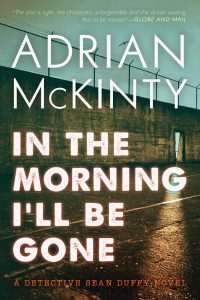 Adrian McKinty’s Sean Duffy Series
Adrian McKinty’s Sean Duffy Series
Adrian McKinty is a crime writer’s crime writer. The first three in the Sean Duffy series function as their own trilogy, but the series was so good that McKinty decided to continue with them (installments 7-9 should be coming out soon). When we first encounter beleaguered Northern Irish detective Sean Duffy, Catholic in a predominantly Protestant police force, he’s a cynical wreck, numbing his pain with drugs from the evidence locker and wisecracking to a soundtrack of loudly played Joy Division. The Sean Duffy series is reminiscent of Leonardo Padura’s Mario Conde series; in each book, police more comfortable with political explanations for things are confronted, over and over, with the apolitical messiness of human nature. The hide-bound nature of superiors leaves Sean Duffy in some rough spots, but also contributes to the sardonic humor that runs throughout the series. This complex portrait of a nation in flux is not to be missed.
 Louise Penny’s Inspector Gamache Series
Louise Penny’s Inspector Gamache Series
Chief Inspector Armand Gamache of the Sûreté du Québec, the eponymous main character of Louise Penny’s series about crime in French-Canada, is a clever, worldly character—with a Cambridge degree, he speaks English with a British accent, and loves history. Louise Penny’s series, which is currently fifteen books strong and takes place in the charming town of Three Pines, offers a gentle approach to the traditional murder-mystery series. There is very little violence, overall—this is a humane, thoughtful, sensitive series. Inspector Gamache is the town’s guardian, and his constituents and readers alike can always rest assured that all will be well again soon. (A brief aside: they are also very, charmingly Canadian—the plot of one novel revolves around a Canada Day celebration. So. Enjoy.)
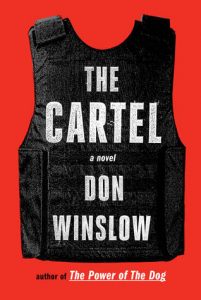 Don Winslow’s Border Trilogy
Don Winslow’s Border Trilogy
This trilogy began in 2005 with The Power of the Dog, which traced the origins of the Sinaloa cartel, modern-day drug trafficking, and the drug wars that have consumed parts of the Americas these last decades. Then in 2015, Winslow returned with a second installment, The Cartel, which on its own stands as one of the boldest, most remarkable achievements in crime fiction in years, expanding Winslow’s incisive eye beyond the cat-and-mouse of DEA agent Art Keller and kingpin Adán Barrera to encompass nearly every rung of the narco-economy and its permeating corruption. With The Cartel, and with 2019’s The Border, Winslow has brought the scope and social purpose of a sweeping 19th century novel to the turbulent, high-octane scenes of the drug wars, and launched a scathing critique of U.S. foreign and domestic policy. These are novels we’ll be reading for generations to come—fictions of the highest, most necessary order. It also doesn’t hurt that they’re make for compulsive, propulsive reading—quite a feat.
Notables:
Boris Akunin’s Inspector Fandorin series · Tasha Alexander’s Lady Emily series · Ace Atkins’ Quinn Colson series · Parker Bilal’s Makana Mysteries series · Cara Black’s Aimée Leduc series · C.J. Box’s Joe Pickett series · Alan Bradley’s Flavia de Luce series · Ken Bruen’s Jack Taylor series · James Lee Burke’s Dave Robicheaux series · Steph Cha’s Juniper Song series · Lee Child’s Jack Reacher series · Reed Farrel Coleman’s Gus Murphy series · John Connolly’s Charlie Parker series · Patricia Cornwell’s Kay Scarpetta series · Aya de Leon’s Justice Hustler series · Tim Dorsey’s Serge Storms series · Janet Evanovich’s Stephanie Plum series · Robert Galbraith’s Cormoran Strike series · Kellye Garrett’s Detective by Day series · Tess Gerritsen’s Rizzoli and Isles series · Sue Grafton’s Kinsey Milhone series · Martha Grimes’ Richard Jury series · Timothy Hallinan’s Poke Rafferty series · Steve Hamilton’s Nick Mason series · Mette Ivie Harrison’s Linda Wallheim series · Rob Hart’s Ash McKenna series · Keigo Higashino’s Detective Galileo series · Joe Ide’s IQ series · Ausma Zehanat Khan’s Community Policing series · Laurie R. King’s Mary Russell series · William Kent Krueger’s Cork O’Connor series · Joe Lansdale’s Hap and Leonard series · Con Lehane’s Murder at the 42nd Street Library series · Donna Leon’s Inspector Brunetti series · Ed Lin’s Taiping Night Market series · Val McDermid’s Tony and Carol series · Walter Mosley’s Easy Rawlins series · Jo Nesbo’s Harry Hole series · Leonardo Padura’s Mario Conde series · Sara Paretsky’s V.I. Warshawski series · Mark Pryor’s Hugo Marston series · Kwei Quartey’s Darko Dawson series · Ian Rankin’s Inspector Rebus series · Kathy Reichs’ Temperance Brennan series · John Sandford’s Virgil Flowers series · Alex Segura’s Pete Fernandez series · Karin Slaughter’s Will Trent series · Sherry Thomas’s Lady Sherlock series · Fred Vargas’ Commissaire Adamsberg series · Jacqueline Winspear’s Maisie Dobbs series











